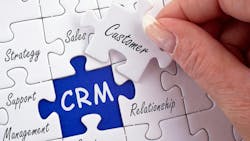Looking for a fast way to fail at CRM (customer relationship management)? Let your technology provider control the conversation.
Don’t get me wrong, software providers mean well, and they can serve as a great copilot for your team. However, it’s impossible for a software provider to understand the needs of every customer. They have limited visibility into your business.
Letting a vendor lead the conversation can result in being sold “bells and whistles” you may not need. They sell features; you need solutions. Don’t let a vendor steer your CRM strategy. Here’s how to take control from the start:
#1. Designate a CEO for CRM
Before jumping into a CRM project, you need a point person. That person is the CEO for CRM and responsible for driving the initiative throughout the entire CRM implementation and beyond.
Change management is hard. That’s why your CEO for CRM should be a respected sales leader who understands your company’s sales processes and the needs of your team. They will be the change agent tasked with changing people’s habits and the way you do business.
Perhaps the most critical element of the CRM project, this leader defines the CRM strategy, ensuring every step aligns with business goals.
#2. Perform a CRM audit
Conduct an internal audit to uncover inefficiencies, user needs and gaps in sales processes. Ask questions like:
- Where are our biggest inefficiencies?
- What operational procedures are we missing?
- Who will use CRM and how?
- What integrations will we need?
- How will training be performed?
Using the CRM audit, you can identify your company’s true needs to map a custom plan for CRM success.
#3. Craft Day-in-the-Life Scripts
Use real-world user experience to align your CRM with real operations. Speak to key team members within your inside sales, outside sales, marketing and customer service departments to learn what processes your team wants to improve. Use these insights to develop a script to compare and contrast technologies for the right fit.
#4. Use the Audit to Inform Demos and Selection
Before accepting demos from potential vendors, assemble an evaluation team comprised of your CEO for CRM and “super users” (key team members from various departments). The script you create from their insights and job duties will serve as a structured roadmap, informing the vendor of your actual needs. Without these insights, vendors may lean on the flashy bells and whistles to pique your interest in a demo rather than highlighting capabilities that align with how you sell.
#5. Use Scorecards for Objective Vendor Tracking
You can quickly become overwhelmed during the selection process. I recommend limiting the number of vendors to four or fewer and selecting only those most closely aligned with your specific needs. Use a structured demo scorecard to keep track of each vendor and their solution. Score vendors on things like:
- Vendor expertise and support
- Integration capability
- Software usability, scalability and reporting features
- Onboarding process, including training and documentation
- Fit for your business and roadmap alignment (driven by your audit)
Consider the experience you had with each vendor. Did they sit with your team, ask questions and evaluate your processes to offer focused solutions for your business? Or did they offer you a pre-canned presentation showcasing the bells and whistles?
After each demo, while fresh in your mind, meet with your team of Super Users to “grade” solutions with a simple thumbs-up or a thumbs-down vote.
#6. Prioritize Out-of-the-Box Solutions
It can be tempting to seek a custom solution for your business. But in my experience, it creates unnecessary complications. Too many tailored specifications can complicate your processes, putting unnecessary work on employees and straining timelines.
Instead, look for CRM solutions that work out of the box with minimal customization. I recommend selecting a CRM option with pre-built functionality for the business processes you want to improve, such as managing leads, opportunities and sales activities. Then, it can be adjusted where needed.
#7. Choose a CRM that Evolves with You
Your CRM should be designed to support where your business has been and where it’s headed. Choose a CRM that supports not only your current needs but can scale and adapt (data governance, ERP integration, taxonomy, etc.) as your business evolves.
That means starting with a clear vision of the goal. As you evaluate your business, consider short-term needs along with long-term ones. This may include adaptation for increased customer volume, more complex sales processes or shifts in the market down the road.
Remember that CRM should be an ongoing initiative within your company. There is no project end date after you make a selection. As your sales process evolves, so should your CRM.
There’s no shortage of CRM solutions, and it can be easy to become swept up. However, armed with your audit, script and scorecard, you can experience CRM success. But only if you – not the vendor – own the CRM project from day one.
About the Author

Brian Gardner
About the Author
Brian Gardner, the founder of SalesProcess360, is the author of “CEO for CRM: Your Roadmap for CRM Success,” the follow-up to his first book, “ROI from CRM: It’s About Sales Process, Not Just Technology.” Brian served as a sales manager for a major regional industrial distribution rep company for 15 years before building Selltis, an industrial sales team CRM solution with roots in process improvement. He took his passion for sales process improvement to the speaking and coaching world with SalesProcess360. He is also a frequent guest speaker on CRM at Texas A&M University and the LSU Professional Sales Institute. Reach him at [email protected].

